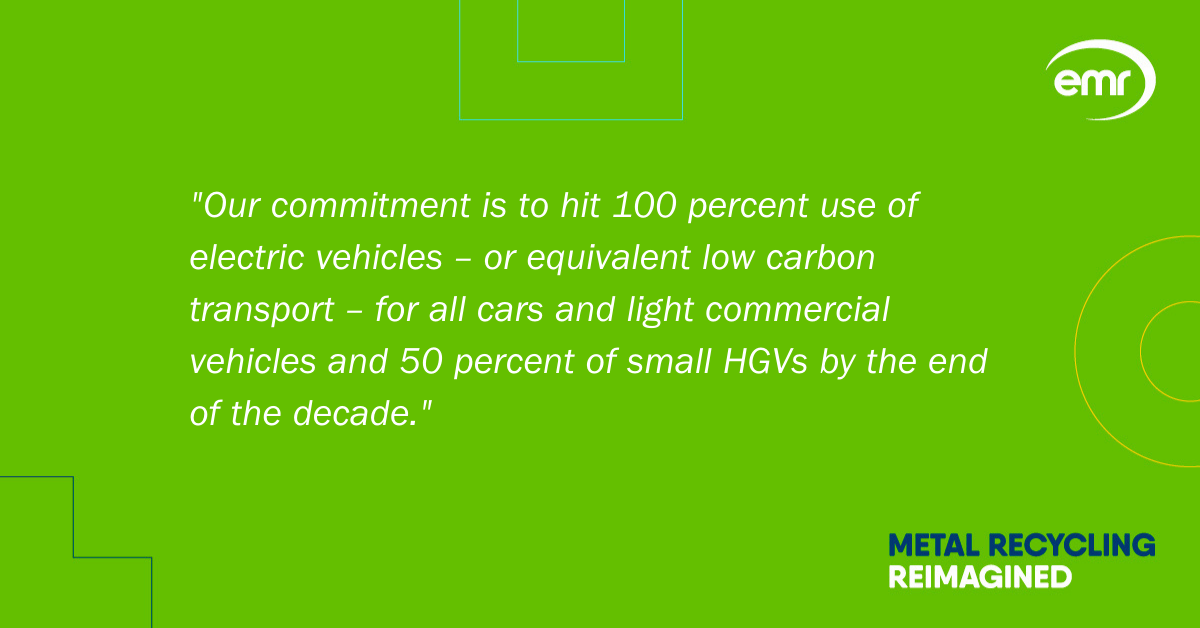A key commitment in EMR's Our Decade of Action strategy is to transition away from the combustion engine wherever possible by 2030.

This is laid out in the Climate Group’s EV100 initiative, which EMR signed up to as part of our efforts to decarbonise the ‘Movement of People’ in our business. Our Decade of Action provides a pathway to this goal, with targets over the next 10 years including switching 30 percent of our cars and light commercial vehicles and 10 percent of small heavy goods vehicles (HGVs) to electric or hydrogen-run equivalents by 2023. By 2026, EMR aims to have 60 percent of our cars and light commercial fleet and 30 percent of our small HGVs running on net-zero technology.
Our commitment is to hit 100 percent use of electric vehicles – or equivalent low carbon transport – for all cars and light commercial vehicles and 50 percent of small HGVs by the end of the decade.
Though ambitious, this goal takes account of what’s currently possible in terms of technology and it means that, by 2030, all the people and a significant part of the material that EMR moves on Britain’s roads will be decarbonised.
However, it is only the first step. If EMR is to cut all of the carbon emissions it produces while moving materials on our roads – 15 percent of the company’s total emissions – then we will need to transition to greener, cleaner technology for our articulated trucks and other large HGVs.
This simply isn’t possible yet. Today’s electric vehicles do not have enough power to propel a truck laden with scrap metal. Similarly, emerging hydrogen-powered vehicle technologies are not yet ready to make the combustion engine a thing of the past.
At EMR we do not see this as an excuse to sit back and wait for vehicle manufacturers to innovate until this problem is solved. Instead, the ethos of the Our Decade of Action strategy is to get to work, wherever possible, to improve our hardware and our processes, delivering whatever cuts in emissions we can right now.
Part of this is set out in our commitment to the EV100 initiative and the progress we’ve already made in electrification of our fleet of cars and light vehicles.
Our highly-trained team of HGV drivers also have a big contribution to make. By working together with our operations and sustainability experts, EMR drivers are finding ways to make each journey more efficient. This can be by cutting idling and hard acceleration during journeys, using the latest mapping technology to ensure every route is as efficient as possible or simply ensuring our fleet is well maintained, extending each vehicle’s lifetime as much as possible.
All these elements can have a major impact on the carbon emissions EMR produces while moving material by road, but, as we look towards the second decade of our journey to net-zero, finding totally decarbonised ways to transport our material around the UK will be essential.
Here, EMR is fortunate in that many of our recycling sites have rail or water transport connections. Increasingly we are moving more of our material movements from road to rail or water transport. Each of these alternative transport options comes with its own net-zero challenges but they already have lower carbon impact than road transport. Our transport partners know the sector that manages to reach this goal first will have a huge advantage and will, to a large extent, dictate our strategy in the decades ahead.
Until that point, EMR is working hard with our team, our customers and climate scientists to find real world ways to reduce the carbon impact of our road use today.
Read about our sustainability commitments and our plan to be net-zero by 2040.